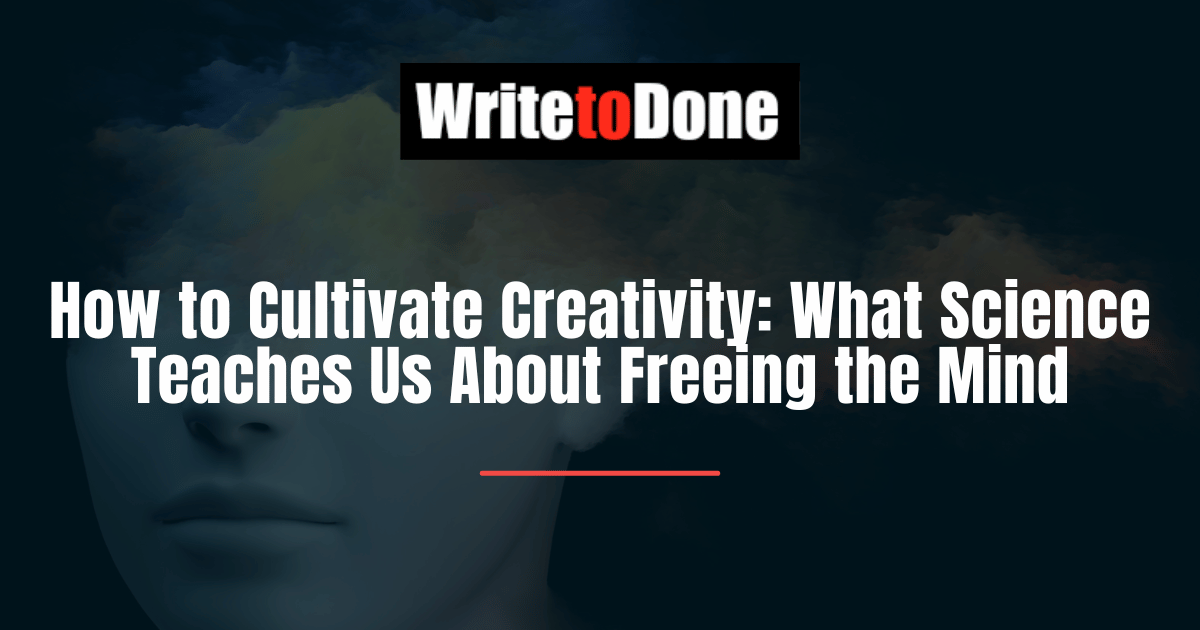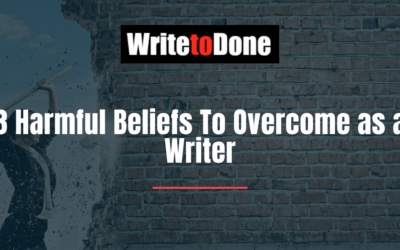Do you struggle with creativity in your writing?
Have you ever spent hours racking your brain trying to solve a creative problem, with no success?
Do you try to force creative moments through sheer effort?
The science shows this may not be the best approach.
Before we jump into the details, let’s see if you can answer these puzzles:
1. Marsha and Majorie were born on the same day of the same month of the same year to the same mother and the same father, yet they are not twins. How is that possible?
2. A prisoner was attempting to escape from a tower. He found a rope in his cell that was half as long as required to permit him to reach the ground safely. He divided the rope in half, tied the two parts together, and escaped. How could he have done this?
3. A man has married twenty women in a small town. All of the women are still alive and none of them is divorced. The man has broken no laws. Who is the man?
You can scan to the end for the answers. (But read the rest of the post first)!
The best creative moments come through insight, not effort
These word games are called insight puzzles, and they were written by researchers studying creativity. They have a common theme – they answers tend to come by flashes of insight rather than by rational deduction.
Chances are, the answers to these puzzles came to you right away or not at all. I’ll be honest – I couldn’t solve any of them at first! But when I read them to my boyfriend, he got all the answers immediately (cue me being extremely jealous). What gives?
Let yourself be distracted
In his book Imagine: How Creativity Works, Jonah Lehrer talks about the specific mental processes behind creativity. He talks about how being able to let your mind wander is a key part to encouraging creative insights.
I am very focused, and have no problem filtering out distractions and attending to one specific task for an extended period of time (a trait that has served me well through years of medical school and residency).
My boyfriend, on the other hand, is incredibly distractable, to the degree that it’s a running joke in our relationship how he quickly he jumps between different interests and projects (last week it was truffle farming, this week it’s do-it-yourself solar panel construction, next week it will be artistic welding). He was diagnosed with ADHD (Attention Deficit Hyperactivity Disorder) as a teenager and has been a free spirit ever since.
The thing is, solving creative problems often involves considering a lot of options, at least subconsciously, before coming to the answer. So focusing too much can actually be detrimental because you tend to ignore potential solutions by only focusing on what you feel is the most likely solution.
In fact, one study of college undergraduates showed that those diagnosed with ADHD performed significantly higher on measures of creativity, both in terms of their performance on creative tests in the lab and their creative achievements (measured by professional awards and accolades), than students without ADHD. Getting distracted can actually encourage creative insights.
In retrospect, my relentless focus kept the creative part of my brain from making the remote associations it needed to in order to solve the puzzles. Trying to force the insight prevented it.
So if sheer effort inhibits creativity, what can you do to encourage creative insights when you need them? After all, the words don’t write themselves, and as we all know, deadlines come and go regardless of whether we’ve felt inspired to create.
Strive for the right frame of mind rather than the answer
Thankfully for us, there are studies showing that certain conditions can encourage creative insights. In particular, feeling relaxed can help your creative juices flow. This is because states of relaxation are associated with a particular type of brain wave called alpha waves, which come about when a person is sitting calmly, usually with their eyes closed, but not asleep.
In one study, participants were hooked up to EEGs (a machine that measures brain waves), and asked to solve creative puzzles like the ones at the beginning of this post. Interestingly, whether or not a person had alpha waves predicted whether they were able to subsequently solve the puzzles. Those participants who didn’t have alpha waves weren’t able to solve the puzzles, even when they were given hints!
In another study, people who scored higher on measures of happiness were able to solve more puzzles. And getting people into a happy mood by showing them comedy clips helped them more effectively tackle the puzzles.
So how does this translate to practical strategies to increase creativity? Remember that relaxation is key. Instead of trying to solve the problem directly (which can inhibit creativity), try to create the calm state of mind that is best suited for creativity. Take a warm shower, get a massage, or go for a walk.
Let yourself stop trying to intentionally try to solve the problem. Go into alpha-wave mode. You may find your mind jumping to make a connection it didn’t make before.
Let go of preconceptions about how the problem can be solved
Let’s talk about a different insight puzzle to illustrate another point – that whenever you are stumped by a creative problem, you are probably making assumptions about the scope of available solutions. See if you can solve this one:
A giant inverted steel pyramid is perfectly balanced on its point. Any movement will cause it to topple over. Underneath the pyramid is a $100 bill. How do you remove the bill without disturbing the pyramid?
You may have been able to get it right away, but if not, I have an idea of where you might be getting stuck. You’re visualizing the problem: imagining the giant pyramid, seeing the dollar beneath it, picturing how you might slip it out without toppling the whole thing over.
But by imagining the problem too specifically you’re actually making a number of assumptions that are not a part of the constraints of the puzzle. In particular, what are you assuming about the word remove? Are you assuming the bill needs to be… intact?
Get it yet? The solution is to set the bill on fire.
By intentionally stepping back and reconsidering the meaning of each word in the problem, new possibilities can appear. For each puzzle at the start of this post, the answer comes out of seeing one or two words in a different light.
So instead of fighting against yourself when you hit the creative doldrums, give yourself permission to relax, get distracted, and let your mind wander, and then try coming back to the problem from a different perspective. You may just find the answer striking you!
What state of mind helps you feel creative? I’d love to hear your thoughts in the comments!
[Answers to the puzzles: 1) They’re triplets, 2) He divided the rope lengthwise, 3) A priest.]
This is a guest post by Elana Miller, MD. She is a psychiatry resident and founder of Zen Psychiatry, a space to talk about integrative strategies be happy, live well, and fulfill your greatest potential. Follow her on Twitter or join the discussion on Facebook.


















